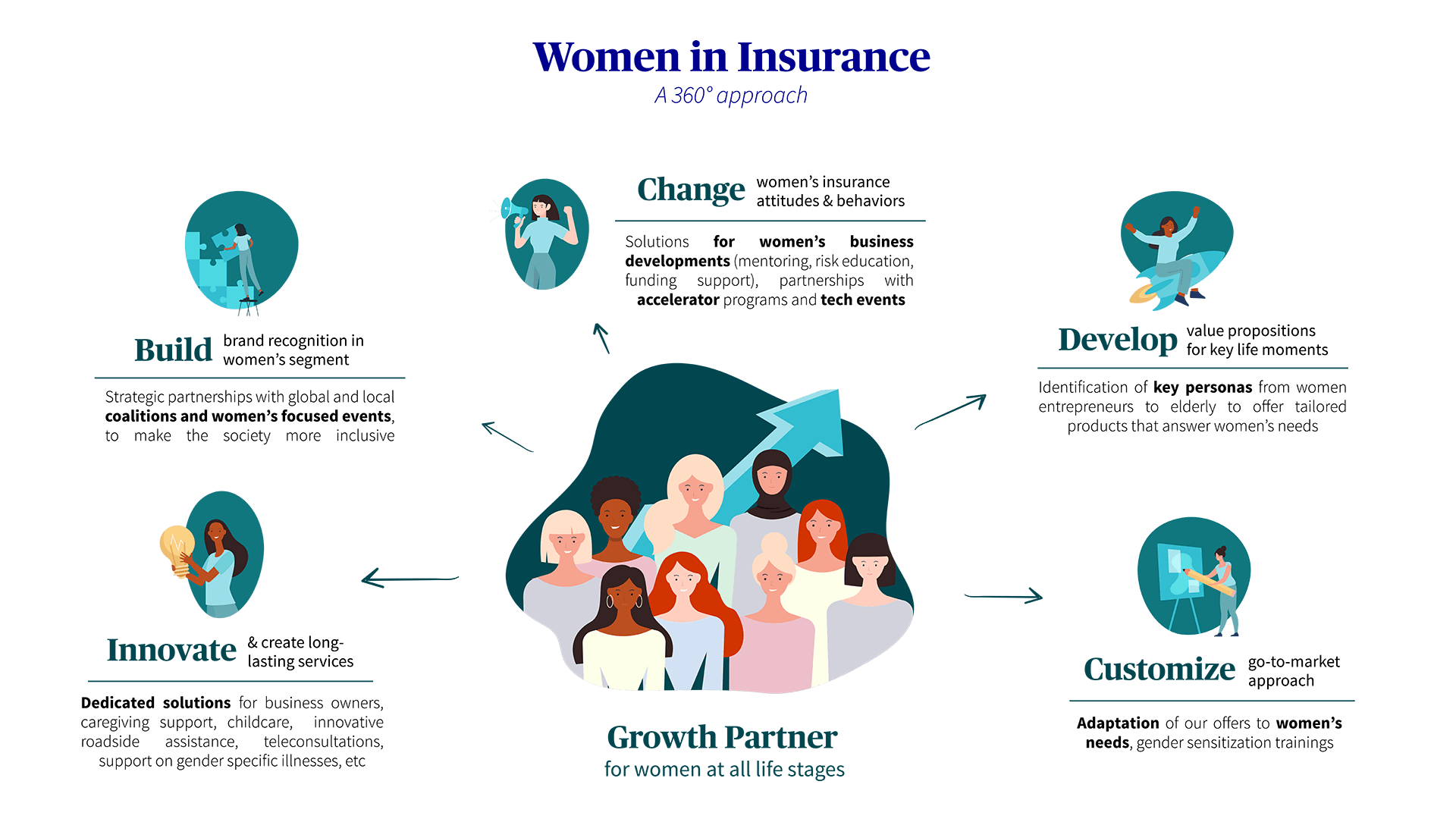
Sustainability
Women in Insurance
Women are the key to progress. They are a vital force for growth and development around the world. We work closely with customers, employees and women entrepreneurs to give them the means to fulfill their dreams, wherever they are.
Protecting women means protecting everyone
While women power the global economy, we know that they are disproportionally impacted by risks. Our mission is to understand and reduce those risks to support them in achieving their goals and aspirations. At AXA, we know for a fact that reducing gaps and supporting women reach their full potential is vital to everyone’s future social and economic development.
However, women have often been overlooked when it comes to insurance. This protection gap
occurs across the globe, in emerging and mature markets alike. By 2030, women will be responsible for insurance purchases of up to $1.7 trillion, with half coming from just 10 emerging economies*.
This represents an immense opportunity, as we can contribute to sustainable, inclusive economic growth around the world while promoting a significant source of social and economic development, especially in emerging economies.
Related content
In partnership with the IFC-World Bank and Accenture, we published a first-of-its-kind study of the women's insurance market in the emerging economies. The study showed that the largely untapped women's insurance market could be a source of development for emerging economies and of tremendous growth for the insurance industry.
Our Women in Insurance
initiative
We are dedicating time and resources to develop services that offer enhanced protection for women, their families, and their businesses. Our Women in Insurance
initiative, launched in 2016, is a comprehensive and holistic approach designed to broaden women's access to tailored insurance products and services that cater to their needs, adapted to their moments of lives.
This involves 2 key ambitions:
- Enabling women entrepreneurs to embrace opportunities and manage risks through personalized products and services that facilitate business growth while prioritizing their well-being and family needs.
- Additionally, it entails enhancing access to healthcare solutions tailored to address women's distinct health requirements and supporting women in the field of science.
While we know women are disproportionately impacted by risks, Women in Insurance
program looks at exploring and setting up actions to cope with emerging risks that impacts women the most. This involves study topics such as
- rise of digital technologies
- climate risks
- pandemics
Furthermore, we care about our customers as we do about our employees. This involves fostering diversity and gender equality within AXA by advocating for equal rights and opportunities for both men and women.

At AXA, we believe everyone has the right to be optimistic and hopeful about the future. We can help raise and nurture that optimism through investigating and understanding the risks women face, as well as providing products and services that help them manage those risks, thus ensuring women can prosper in their professional and personal lives. I strongly believe that women have a unique role in shaping a positive future.
Support female founders to drive social and economic progress
Overcoming access to financing and gender bias in the entrepreneurial sector is one of the two key pilar of the Women in Insurance initiative.
Women entrepreneurs face funding disparities; in 2021, they represented only 14% of solo start-up founders in Europe but received a mere 1% of venture capital funding. Limited business networks contribute to difficulties in securing investments, especially in the IT sector, which garners the most venture capital globally.
Moreover, the intertwining of personal and business lives presents unique challenges for women entrepreneurs. Life events like childbirth, illness, and caregiving responsibilities significantly impact their income-generating activities, leading to a higher risk of business interruption and a greater need for income protection insurance.
At AXA, we are long-time supporter of female entrepreneurship by providing tailored solutions addressing their dual roles. We collaborate with global associations to enhance women's access to finance, local or global start-up accelerators, and support research in this field, aiming to promote their financial independence.
Making a lasting impact on women's health...
Women’s health stays a priority for us, since women have less access to medical care. According to WHO, in Europe women have higher life expectancy, but suffer from poorer health conditions. Another problem is the lack of sufficient coverage that addresses women’s needs, since some diseases are unique to women.
At AXA, we focus on addressing specific needs related to women’s health and on providing sufficient coverage for women on different stages of their life, as well as making sure that women have access to online and in-person consultations, that would ensure early diagnosis of specific diseases.
Supporting health research is one of three priorities for the AXA Research Fund alongside environment and socio-economics. More than EUR 3 million have been allocated to academic research projects looking at women’s healthcare. The AXA Research Fund finances academic research projects into mental health and well-being, expanding knowledge and removing the stigma surrounding mental health issues. Additionally, we tailor our health solutions to better fit women’s needs.
Supporting women when facing emerging risks
Rise of Digital Technologies
Despite the domination of digital technologies in our everyday life, there is still a significant digital divide between women and men. Particularly in emerging countries, women are less likely to own a mobile or have access to a computer. Online safety has also become a major concern for women – through sexual harassment and misuse of personal images, as well as the risk of identity theft.
Moreover, women are still underrepresented in science, technology, engineering and mathematics (STEM), widely recognized as the professions of the future. According to World Bank figures, women currently account for approximately 1 in 3 STEM graduates in Europe and the US.
AXA puts emphasis on the importance of education and encourages women in science by supporting community trainings, educational programs, philanthropic work and sponsorship of major technology events.
Around the world, the AXA Research Fund supports 235- women scientists, engaged in research on topics ranging from using nano-materials in healthcare and legacy pollutants in food to the public health risks caused by aging. In total, women make up more than 40% of researchers supported by the AXA Research Fund, well above the worldwide average for women researchers.
Climate Change and Environmental Degradation
Women often bear the brunt of climate change. That’s because, generally, they don’t have access to the same resources. More women than men live in poverty worldwide. Particularly in emerging countries, women rely more on natural resources. According to the UN, women account for most of the world’s food production, but own less than 10% of the land. Involving women more in responses to climate change help conservation, reduce poverty and build long-term resilience. The health effects of indoor and urban pollution add to their care burden.
AXA addresses these risks through design of specific insurance products to protect customers against the effects of climate change, supports academic research into the impact on women and what can be done to strengthen their role in responding to climate change through AXA Research Fund.
Rise of pandemics
Pandemics hit women harder due to existing inequalities – lower pay, precarious jobs, and financial instability. During COVID-19, almost half of women tapped into savings or sought external support. Their overrepresentation in affected sectors like healthcare amplifies exposure to infectious diseases. Despite challenges, women play a vital role in pandemic response. In the Ebola outbreak, the UN partnered with women for community awareness. Similarly, during COVID-19, many women became their families' de facto Chief Medical Officer, handling health issues and coordinating tests and appointments.
During the Covid pandemic, AXA issued the series of 3 reports we issued to address the Covid-19 impact on women, who played a crucial role when talking the pandemic, addressing the economic, health and technological impacts of the pandemic for women.
Within our company, AXA is working to remove the last remaining inequalities in pay and opportunity
AXA is fully committed to progress towards gender parity as illustrated by our Group commitment to reach gender parity amongst our senior executives population (called the Global leadership Network (GLN) and gathering approximately 250 members). We are proud to have progressed to (41%) today and we continue our journey to sustainably increase the number of women at the top.
Encouraging gender parity means AXA promotes talented women internally and creates opportunities for career advancement. To support our goals, AXA has policies and programs in place across the group to; strengthen processes around recruitment and promotion at all levels of the organization. To ensure everyone is equitably renumerated and pay is consistent and free from discrimination and to provide training and development opportunities.
I am happy to see that the commitment of all our leaders to gender equality has enabled us to make tangible progress. Parity and inclusion are not an option and we are committed to embracing all Inclusion and Diversity dimensions as core to our business strategy.
In 2023, we launched We Care, a global program designed to provide support for employees at important life stages and during moments that matter. While the program will support all AXA employees, many of the policies also address the challenges commonly encountered by women, notably related to their health and safety. The program also extends parental leave for the co-parent to encourage equity in children care.





